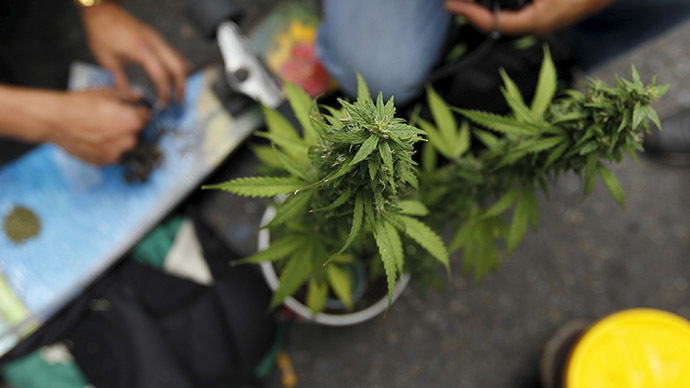Medical marijuana falls short of easing symptoms of dementia – study

Medical marijuana pills do not help relieve dementia symptoms any better than placebo treatment, researchers in the Netherlands have found, refusing however to draw any conclusions on the drug’s effectiveness until higher doses are tested.
The study published in the journal Neurology on Wednesday by researchers from Radboud University Medical Centre concluded there was little benefit in easing dementia symptoms such as agitation, aggression or wandering when taking a course of pills containing THC – the main ingredient found in marijuana.
READ MORE: Puerto Rico moves to legalize marijuana for medical uses
For three weeks, 50 patients with dementia and without other illnesses, were given pills daily. Of the group 26 received a placebo and 24 received 4.5 milligrams of THC. The study was double-blinded so neither the researchers nor the patients knew which group was which. Caregivers recorded levels of symptoms like agitation and aggression in a survey and repeated the survey after two weeks and then after three weeks and the trials conclusion.
Researchers analyzing the survey scores noted that patients using THC and the placebo group showed no statistical difference.
“The improvement in the placebo group was remarkable, as dementia is a progressive disease,” said Dr. Marcel Olde Rikkert, who is chair of geriatrics at Radboud Alzheimer Center and author of the study, according to Health Day News. “The improvement might have been caused by the fact that the patients received a lot of support during the study, or to the placebo effect.”
READ MORE: A pot for weed money; Lawmakers try to legalize marijuana banking
The doses are much lower than for someone smoking the drug recreationally and this had led researchers to conclude that while the pills were well-tolerated it also seems safe to test higher doses in future studies, before drawing any conclusions.
Rikkert said the doses in the study were comparable to those used in other studies which led him to conclude “that former results were biased by not being strictly blinded or otherwise biased.”
“There were no side effects, no ‘high’ feelings, and with very sensitive gait and balance measure we could only find minor changes,” said Rikkert.
As increasing numbers of US states are either by laws or ballot initiatives approving the use of medical marijuana with its many promises to alleviate suffering from Parkinson’s, HIV/AIDS, epilepsy and multiple sclerosis, missing are the studies to back those claims. In the United States as marijuana is still illegal considered a Schedule A drug along with cocaine, LSD and heroine under federal laws there are no government funded studies on the drug, and limited funding available.












